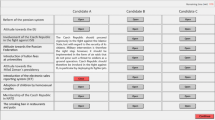Abstract
Chronic accessibility refers to a long-term bias to notice, process, and have available for recall certain types of information across a variety of different stimulus objects in a variety of different situations. This paper illustrates the usefulness of studying the chronic accessibility of political constructs in the field of political behavior. The chronic accessibility of four generic political constructs are operationalized: candidates, issues, groups, and parties. The accessibility of these four political constructs is shown to be relatively stable over time and to guide the processing of information about a wide variety of political objects. Next, a voting model is tested that identifieswhich voters will rely chiefly on issue orientations, group orientations, candidate orientations, and/or party orientations in making their vote decision. The voting model is validated across two distinct ways of operationalizing the political chronicities and three different election studies spanning a 28-year period. Finally, although this paper has focused onindividual political behavior, several ways that an information processing approach could shed light on macrolevel political questions are discussed.
Similar content being viewed by others
References
Bargh, J. A., and Pratto, F. (1986). Individual construct accessibility and perceptual selection.Journal of Experimental Social Psychology 22: 293–311.
Bargh, J. A. and Thein, R. D. (1985). Individual construct accessibility, person memory, and the recall-judgment link: the case of information overload.Journal of Personality and Social Psychology 49: 1129–1146.
Bentler, P. M. (1980). Multivariate analysis with latent variables: causal modeling.Annual Review of Psychology 31: 419–456.
Campbell, A., Converse, P. E., Miller, W. E. and Stokes, D. E. (1960).The American Voter. New York: Wiley.
Campbell, A., Gurin, G. and Miller, W. E. (1954).The Voter Decides. Westport, Conn.: Greenwood Press.
Citrin, J. (1974). Comment: The political relevance of trust in government.American Political Science Review 68: 973–988.
Converse, P. E. (1964). The nature of belief systems in mass publics. In D. E. Apter (ed.),Ideology and Discontent, pp. 206–261. London: Collier-Macmillan.
Converse, P. E. (1975). Public opinion and voting behavior. In F. Geenstein and N. Polsby (eds.),Handbook of Political Science, Vol. 4, pp. 75–170. Reading, Mass.: Addison-Wesley.
Downs, A. (1957).An Economic Theory of Democracy. New York: Harper & Row.
Erber, R. and Lau, R. R. (1986). Political cynicism revisited: the role of political schemata in the decline of trust in government. Paper presented at the 82nd annual meeting of the American Political Science Association, Washington, D.C., 1986.
Herstein, J. A., Jr. (1981). Keeping the voter's limits in mind: A cognitive process analysis of decision making in voting.Journal of Personality and Social Psychology 40: 843–861.
Higgins, E. T. and King, G. A. (1981). Accessibility of social constructs: information-processing consequences of individual and contextual variability. In N. Cantor and J. F. Kihlstrom (eds.),Personality, Cognition, and Social Interaction, pp. 69–121. Hillsdale, NJ: Erlbaum.
Higgins, E. T., King, G. A., and Mavin, G. H. (1982). Individual construct accessibility and subjective impression and recall.Journal of Personality and Social Psychology 42: 35–47.
Joreskog, K. G. and Sorbom, D. (1984).LISREL VI: Analysis of Linear Structural Relationships by the Method of Maximum Likelihood. Chicago: National Educational Resources.
Kelly, G. A. (1955).The Psychology of Personal Constructs, Vols. 1 and 2. New York: Norton.
Kinder, D. R. (1986). Presidential character revisited. In R. R. Lau and D. O. Sears (eds.),Political Cognition: The 19th Annual Carnegie Symposium on Cognition, pp. 233–256. Hillsdale, NJ: Erlbaum.
Kinder, D. R. and Kiewiet, D. R. (1979). Economic discontent and political behavior: the role of personal grievances and collective economic judgments in congressional voting.American Journal of Political Science 23: 495–527.
Lasswell, H. D. (1936).Who Gets What, When, How. New York: McGraw Hill.
Lau, R. R. (1986). Political schemata, candidate evaluations and voting behavior. In R. R. Lau and D. O. Sears (eds.),Political Cognition, pp. 95–126. Hillsdale, N.J.: Erlbaum.
Lippman, W. (1922).Public Opinion. New York: Macmillan.
Markus, H. (1977). Self-schemata and processing information about the self.Journal of Personality and Social Psychology 35: 63–78.
Miller, A. H. (1974). Political issues and trust in government: 1964–1970.American Political Science Review 68: 951–972.
Miller, A. H., Wattenberg, M. P., and Malanchuk, O. (1986). Schematic assessments of presidential candidates.American Political Science Review 80: 521–540.
Sears, D. O., Lau, R. R., Tyler, T. R. and Allen, H. M., Jr. (1980). Self-interest vs. symbolic politics in policy attitudes and presidential voting.American Political Science Review 74: 670–684.
Simon, H. A. (1985). Human nature in politics: the dialogue of psychology with political science.The American Political Science Review 79: 293–304.
Author information
Authors and Affiliations
Rights and permissions
About this article
Cite this article
Lau, R.R. Construct accessibility and electoral choice. Polit Behav 11, 5–32 (1989). https://doi.org/10.1007/BF00993365
Issue Date:
DOI: https://doi.org/10.1007/BF00993365




